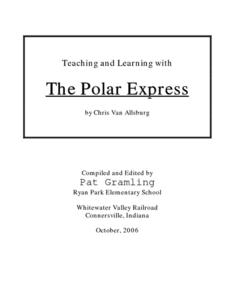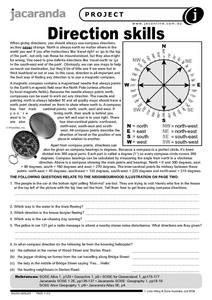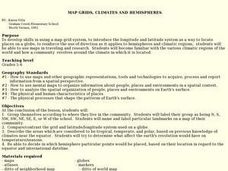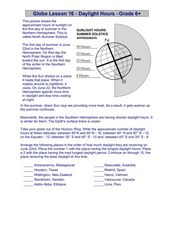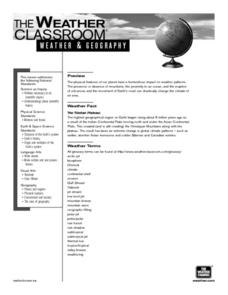Curated OER
Rising Sea Levels: UK and Bangladesh
Students explore the possible effects of global warming. In this geography/global warming lesson, students identify regions using an atlas and complete a global warming worksheet. Students perform an experiment in which they simulate...
Curated OER
North And South Pole Venn Diagram
In this compare and contrast instructional activity learners use a Venn diagram. Students compare and contrast the North Pole and the South Pole. No information is provided.
Curated OER
World Map and Globe-Equator, North Pole, and South Pole
Students identify the Equator, North Pole, and South Pole on a map. In this geography lesson, students use a world map and circle the North and South Pole. Students locate the Equator on a globe and use a map marker to highlight it.
Curated OER
An Expedition to the North Pole Scavenger Hunt
In this North Pole worksheet, students explore the Internet to access one specific website to find the answers to five short answer questions about the North Pole.
Whitewater Valley Railroad
Teaching and Learning with The Polar Express
Use a series of extension activities to enhance your class reading of Chris Van Allsburg's holiday classic, The Polar Express. From a biography of the author to filmed book reviews and research about the railroad, kids can take...
Curated OER
Earth's Features
In this geography worksheet, learners label a map of the world with the Arctic Circle, Tropic of Capricorn, Tropic of Cancer, Equator, North Pole, South Pole, and the Antarctic Circle.
Curated OER
Direction Skills
In this geography worksheet, students read an excerpt on what directions tell someone. They respond to 6 short answer questions related to the neighborhood illustration found on the second page of the worksheet.
Curated OER
Canada...A Visual Journey
Students work together to analyze the six natural regions of Canada. Using this information, they create a visual representation of each region on a large wall map and present it to the class. They must identify five key points of each...
Curated OER
Polar Day: Living in the Canadian North
Students study the Canadian North. In this Canadian North lesson, students study the physical characteristics and the lifestyles of people in that region. Students complete map making and creative activities that help them learn about...
Curated OER
Canada's Arctic Barometer
Students research arctic climates. In this Web-quest investigation, students will identify Arctic climate changes, explain the effects of these changes, relate the changes to other regions, and write their findings in a letter format.
Curated OER
Children's Literature Across the Curriculum Ideas-Polar, The Titanic Bear
Learners read Polar, The Titanic Bear by Daisy Corning Stone Spedden. They complete a variety of cross-curricular activities surrounding this true story of a toy bear that survived the sinking of the Titanic. Included are reading, art,...
Curated OER
World Map and Globe - Four Main Directions
Students study the four main directions on a map. In this map lesson, students locate the North and South pole, and learn the four cardinal directions. They use the compass rose on a map to help with the directions. (Map is not included...
National Geographic
Australia, Antarctica, and Oceana
Go on a traveling adventure throughout Australia, Oceana, and Antarctica! This textbook excerpt offers a full unit of study that can easily be supplemented by extra projects or research materials. Learners study maps, read about...
Curated OER
MAP GRIDS, CLIMATES AND HEMISPHERES
Students compare/contrast the grid and latitude/longitude system used on a globe. They describe the areas which are considered to be a tropical, temperate, and polar, based on knowledge of climates.
Curated OER
The Arctic and Taiga Ecozone of Canada
Students discover the differences in the Arctic and Taiga regions of Canada. They identify physical and human characteristics of both region. They also practice using an atlas.
Curated OER
Globe Lesson 16 - Daylight Hours
In this geography skills instructional activity, students read an instructional passage regarding daylight hours and then respond to 5 short answer questions.
Curated OER
The Tibetan Plateau
Learners discuss the characteristics of the biosphere, with a focus on the Tibetan Plateau. They participate in a question and answer period discussing biomes and climate patterns. They compare and contrast different ecosystems.
Curated OER
Alaska
In this Alaska worksheet, students complete 6 pages of readings and questions about the state of Alaska. Included are general facts, First Nation groups, European arrival, industry and people. Each page has a short text and 6 multiple...
Curated OER
Antarctica Vocabulary Quiz
In this Antarctica vocabulary worksheet, students match vocabulary words about Antarctica with definitions, 15 words total. Worksheet contains a link to additional activities. Labeled as a quiz, but may be used for practice or review.
Curated OER
Exploring Alaska's Seamounts - Volcanoes, Plates, and Chains
Students examine the formation of seamounts in the Gulf of Alaska. In this seamount lesson plan, student focus on how the Axial-Cobb-Eikelberg-Patton chain was formed. They learn the associated vocabulary, and watch a teacher...
Curated OER
Some Like it Cold: Canada's Northern Communities
Fifth graders examine cultures close to the arctic circle. In this geography lesson, 5th graders consider the impact of climate on cultural development of arctic communities. Students research a given community and present their findings...
World Wildlife Fund for Nature
Wwf: Our Earth: Ecoregions: Habitats: Polar Regions
A simple introduction and overview of the polar regions. Includes a link to information about animals that live in a polar habitat.
Woods Hole Oceanographic Institution
Polar Discovery: Compare the Poles
A detailed comparison of many aspects of the two polar regions. Includes physical features, seasons, weather, types of ice, plants and animals, human population, and climate change.
Other
Polar Continental Shelf Project for Kids!
Visit this resource to learn about the geography, wild life, plants and people of Polar Continental Shelf in Canada's Arctic. Students can take a quiz to see how much they have learned.




